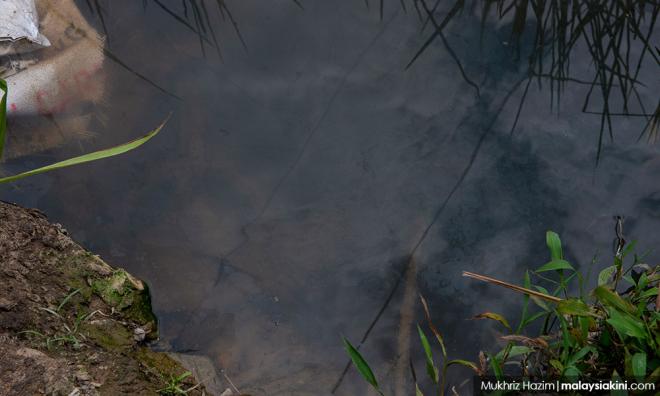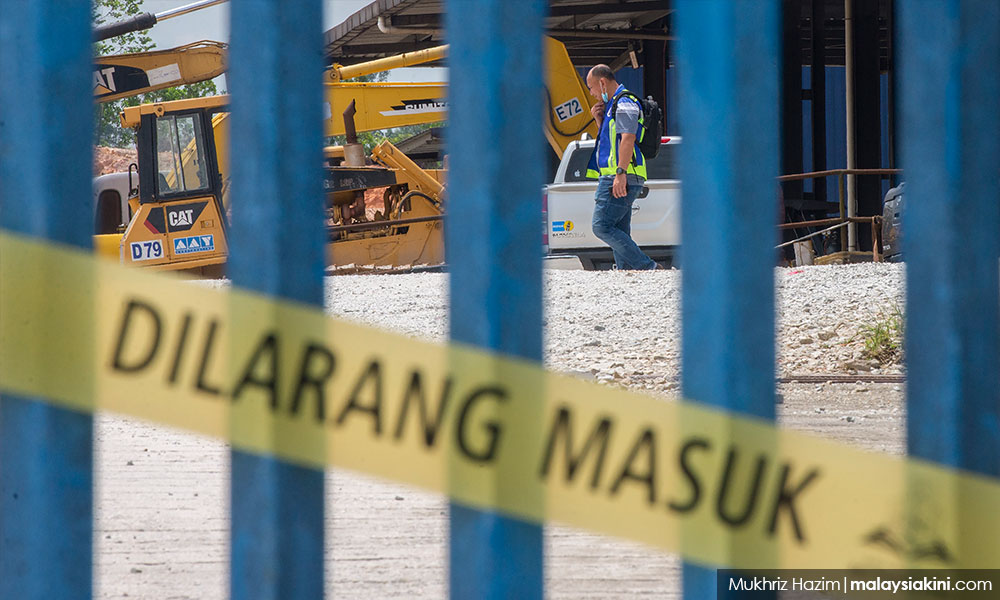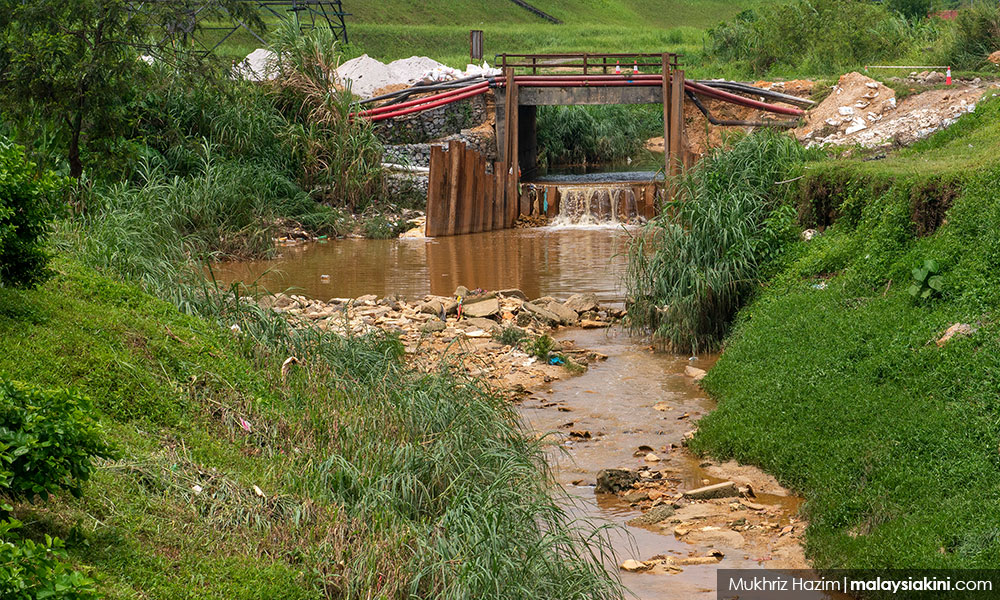Klang Valley's water pollution woes: An enduring unsolved mystery

In the midst of heavy downpours the last few days, Klang Valley residents were greeted by rather ironic news, a major shutdown of water supply for about a week in 1,292 areas affecting nearly 1.2 million consumer accounts.
Consumers had expected a serious breakdown, but they were instead told that the cause is due to a single factory discharging illegal waste into the waterways. To boot, this is a repeat offender who was compounded RM60,000 in March for a similar offence.
As the issue is being played out in the mainstream and social media, the people hear with utter disgust the same old broken record being replayed over and over again.
Brickbats and mudslinging are happening among the old and new regime. Meanwhile, the authorities are "alarmed" and promising "no stones left unturned". They are calls for even stricter penalties, more vigilance and stricter enforcement, and the hunt to bring the culprits to book - as if that itself will solve the problems.
But the people have yet to hear from the authorities why this problem keeps gushing out again and again, or even a tinge of remorse or apology for the calamity caused, nor an assurance that this problem will be solved permanently.
Social media is abuzz with stinging comments so much so it has now become a sickening trending joke, like the advisory to wash hands frequently.
Polluters-pay principle
Rather than add to the chorus, let me suggest a few actions the authorities should seriously consider after this incident dies down. This is based on the tried and tested basic principles of environmental management, namely the polluters-pay principle, prevention being better than cure, the repercussions of environmental crime and environmental security on society, to name a few.
The Environmental Quality Act 1974 was amended in 2012 to impose heavier penalties; a jail term of up to five years, fine of up to RM500,000 and RM1,000 a day until the offence is mitigated.
Yet, why was the earlier offence compounded for a mere RM60,000? Why were they not charged in court? It has now emerged that even though the offenders owned the land, they do not have the planning and development approval to erect the building and premises.
Consequently, that means they do not have the environmental licenses for their prescribed industrial activity, nor subjected to monitoring the discharges from their business.
Yet they were allowed to operate after compounding. An ordinary citizen for a minor infraction is subjected to periodic reporting to authorities, while the case is tried in court.
Now, who bears greater responsibility for the present alleged crime, the authorities or the factory operator? Persistent calls for increased penalties just sounds so hollow. In fact, many will be financially incentivised to break the law, the way it is enforced.
Secondly, enforcement and spot checks alone will not solve this problem. From the year 2000, I have organised and led delegations from Asean countries on study tours to developed countries on their real-time self-reporting environmental monitoring and surveillance, among others.
While that was an expensive and novel technology at that time, such systems are available now at a fraction of the cost. Every licensed premises and activity should include a component of self-monitoring and surveillance that should be reporting real-time to the authorities.
Such premises should bear its own costs, and the system can pay for itself from savings of physical monitoring and enforcement.

In the March incident, the authorities should have closed down the illegal factory permanently. In any case, no monitoring was carried out until it led to this incident again?
Thirdly, the responsible authorities and persons should be made to pay for the damages caused. I would suggest that the water concessionaires voluntarily suspend their billing or offer a discount commensurate with the damage and inconvenience caused.
This will demonstrate their goodwill and commitment in tackling the problem once and for all, rather than just empty talk. If not, consumers should file class action for violating the contractual agreement to supply uninterrupted clean water.
This is the "polluters-pay-principle" in action. It is up to these water concessionaires to recover such costs from those contractually liable, including the culprits, apart from their criminal liability.
Billions of ringgit, mostly taxpayers' money, have exchanged hands first to privatise, and then to re-acquire, yet this seemingly minor issue is not only intractable but is getting worse.
Fourthly, it would seem a strange coincidence that an illegal discharge occurs during heavy downpours. In fact, common sense suggests this could be a prevailing practice among would-be offenders, hoping that the increased volume of water would dilute the pollutants.
It may happen all the time, slow and regulated releases to escape the attention of the authorities. So the danger of illegal discharge is ever-present.

Again this goes back to the earlier suggestion for real-time monitoring and reporting by prescribed premises and persons. Otherwise, the Sungai Gong incident will inevitably sprout like mushrooms during thunder and heavy showers.
Finally, in the longer term, authorities should strictly enforce land-use zoning and planning, which looks good on paper in the authorities' Local Plans. Immediately, actions against illegal land use, buildings and encroachment should be strictly enforced.
National security issue
The government is doing a great job in enforcing Covid-19 compliance nationwide, and this exercise will pale in comparison as long as there is commitment and bipartisan political will.
The Klang Valley is the most developed and populous nerve centre of social activity, commerce, industry, and government in Malaysia. Yet, a single small-time factory operator could cripple it for days.
The government should treat this as a national security issue. I am gratified the police have now taken over the case. In addition, collusive behaviour should not be ruled out.
Only committed and persistent actions, going well beyond the current hive of concerns and promises, can solve this rather paradoxical mystery once and for all.
RAMAN LETCHUMANAN was director, environment/conservation, Ministry of Science, Technology and the Environment (1993-2000), head, environment/haze/ disaster management, Asean Secretariat, Jakarta (2000-2014) and senior fellow, S Rajaratnam School of International Studies (RSIS), Nanyang Technological University, Singapore (2014-2016). - Mkini
The views expressed here are those of the author/contributor and do not necessarily represent the views of MMKtT.
✍ Credit given to the original owner of this post : ☕ Malaysians Must Know the TRUTH
🌐 Hit This Link To Find Out More On Their Articles...🏄🏻♀️ Enjoy Surfing!



















Post a Comment